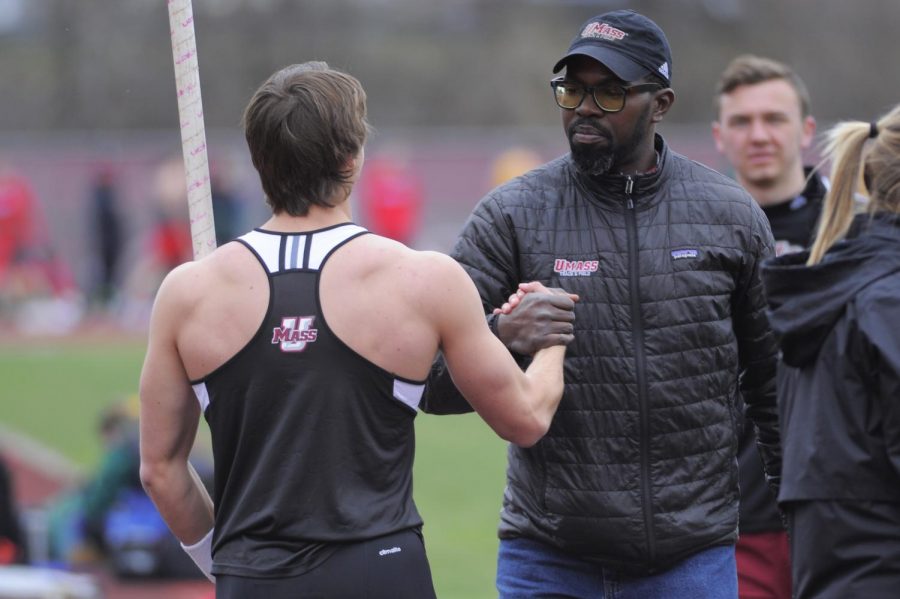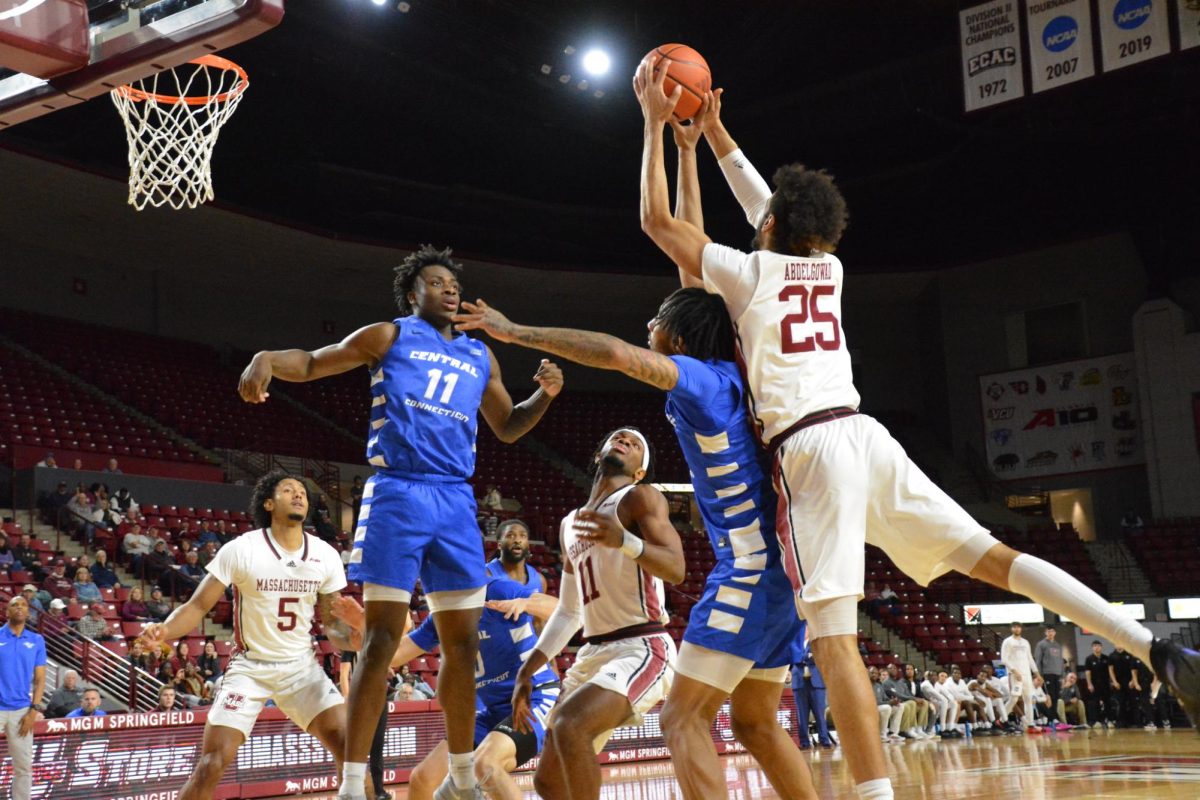He may seem like a fresh face at the helm of Massachusetts men’s track and field team, but David Jackson is no stranger to the sport or to the school.
Midway through his first year as head coach, he’s already in his ninth at UMass, following several years at the University of North Carolina and Roberts Wesleyan College, as well as a high school and collegiate career as a sprinter.
A lot of time has passed since the Minutemen last transitioned program directors. When former head coach Ken O’Brien first signed on, it was 1968. Lyndon B. Johnson was in the White House and the Beatles were still together. But now, a half-century later, O’Brien has entered retirement and turned the keys over to his former assistant.
Thus far, the 2017-18 athletic seasons have proved smooth for Jackson and his teams; cross country placed sixth in the Atlantic 10, and just last weekend, indoor track and field placed fifth. But even as they push forward, all systems go, athletes and coaches alike are learning from each other and adapting to the new environment.
With each passing week, workout, training run and meet, Jackson takes on a new scenario and adapts to it. That’s simply the challenge of stepping into the head coaching role of a Division I team. “Every day of this first year is a new day,” Jackson said. “I haven’t experienced that day before.”
***
Having several years to learn the team and its practices has certainly helped Jackson with the transition.
Jackson entered the program in 2009 as an assistant to O’Brien and Julie LaFreniere, head of women’s track and cross country. Between those two are over 80 years of head coaching experience at UMass and, as Jackson says, studying under the experts helps you to “not know what you know, but to know what you don’t know.” There are certain lessons only eight decades in the sport can teach you.
And coming from within this specific program certainly helps to smooth the transition. Jackson’s years as an assistant on UMass’ small staff prepared him, to some extent, to handle the workload and the variety of hands he’d be dealt as a head coach.
In his time as an assistant, Jackson handled the all field events, hurdles, and decathletes, more than enough for one coach alone to take on. When working with few coaches and many athletes, “We all had to do everything in order to sustain any level of success,” he says.
But beyond that, Jackson has entered his new role with an understanding of the culture of UMass track and field and what it means to be a member of the team. When interviewing for the assistant coaching job in 2009, he looked to the athletes and noticed the drive that many of them had.
“I saw something in the kids,” he reflects. “Some kids had a high level of talent, some had high level of develop ability. It allowed me to see how good of a coach I could be.”
Continuing this positive and unified team culture is crucial to winning, Jackson believes. He recognizes the individuality of running, and says that it’s “easier for us to get lost in the day-to-day grind and successes.”
During cross country this past fall, his first season as head coach, Jackson repeatedly stressed the importance of a team atmosphere. Following one of the first meets of the year, he said, “our strength this season will be that we can run together. If they can continue to run as a group they can feed off that energy.”
This belief in the value of every member of the team is more evidenced in Jackson’s actions. When discussing a meet, he’ll often start talking about specific athletes, even those in the middle or back of the pack, and the battles they fought in their race.
Following an early season cross country meet, Jackson was asked to highlight any runners he was proud of. He mentioned Erik Engstrom, the team’s first finisher, but then transitioned and discussed freshman Chris Polanco, the final one across the line for UMass, who was also in his first 8-kilometer collegiate race. “Everyone won some sort of little battle today,” Jackson said.
***
This year and the few that follow will mark uncharted waters for the program. It has been a while since UMass handled a head coaching change, and with that brings an opportunity to set out in a new direction. In the past, UMass has struggled to some extent finding success at the championship level. The program has only ever won two A-10 titles between cross country and the two track seasons, and none in the last ten years.
Despite these historical roadblocks, Jackson believes that as the university’s national academic profile grows, so does the opportunity to recruit higher caliber athletes.
“The standard of the university and the quality of the degrees gets to the point where kids getting into school here is a big deal,” he said. “This will bring in more top-tier recruits, which will drive the competitiveness of the program upward.”
UMass has also expanded its coaching block, bringing on multiple full-time assistants, and allowing for more focus on improving individual athlete’s skills.
The days of Jackson-led field events, hurdles and beyond are in the past, giving way for a new set of assistant coaches to bring in their specific expertise. Last year, John Adamson joined the program to coach sprinters, hurdlers and high jumpers, and this fall the staff expanded to include Taelour Murphy and John Napolitano, with Murphy coaching sprinters and Napolitano coaching throwers.
In just one season, the changes are palpable. Napolitano coached freshman Danielle Notarfrancesco of the women’s team to second place at A-10s and a school record in the process. Jackson said that he hopes to include more throwers on his roster for the spring season.
Jackson has big and long-tenured shoes to fill, but by talking to him you wouldn’t even know he’s been in charge of the program for just two seasons. He operates each day with a driven mindset and an all-business coaching style. He even concludes his voicemail with an energetic “Go UMass!”
The next few years may be noticeably different for UMass track and cross country. New coaches bring fresh ideas, cultures and training to their programs. But Jackson has been around the block more than once with this team, and has seen from the inside what makes it tick. He knows what type of environment and workload allowed the Minutemen to place fifth in this year’s A-10 Indoor Championships, and understands what it will take to reach toward the coveted conference trophy in the coming seasons.
He lists off his athletes’ results at the A-10 meet from memory, from Jake DeGrace’s second place in the 60-meter hurdles, to John Chuma’s pole vault and Noah Kortkamp’s long jump.
“These are the pieces that will allow us to put things together,” he says. Jackson is looking to the outdoor season already and considering how training with assistant coach John Murray will help his distance runners, Dawson Bathgate and Erik Engstrom.
Jackson is open about his goals for the team down the stretch, saying “I want us to be on that podium. I want us to be fighting for a title.” And while he recognizes the challenges that will face his team when competing against larger, more established, and better-funded programs, he believes that UMass just needs to be smarter and capitalize on every chance to succeed.
With Jackson at the wheel, committed assistants beside him and motivated athletes ready to compete, this will be a team to watch over the next decade. Each day may bring a new challenge, but to Jackson, they’re just new opportunities he hasn’t seen yet.
“We’re not hoping”, he says about UMass’ future. “We’re moving forward.”
Will Katcher can be reached at [email protected] and followed on Twitter at @will_katcher.




















